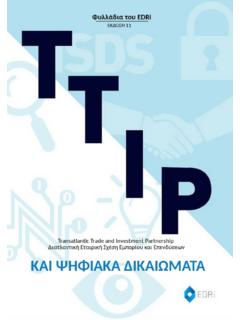Transcription of AND DIGITAL RIGHTS - EDRi
1 The EDRi papersEDITION 11&ransatlanticradetnemtsevnpihsrentraAN D DIGITAL RIGHTSE uropean DIGITAL RIGHTS (EDRi) is a network of 33 civil and human RIGHTS organisations from 19 European countries. Our goal is to promote, protect and uphold fundamental human RIGHTS and freedoms in the DIGITAL : Joe McNamee and Maryant Fern ndez P rez (EDRi)Authors: Maryant Fern ndez P rez (EDRi), Estelle Mass (Access),Ed Paton-Williams (Open RIGHTS Group),Aldo Sghirinzetti (EDRi intern), Ton Siedsma (Bits of Freedom), Walter van Holst (Vrijschrift) and Ante Wessels (Vrijschrift)EDRi is thankful for the comments received by Ralf Bendrath (Digitale Gesellschaft), Jozef Halbersztadt (EDRi observer, Internet Society Poland), Sebastian Lisken (DigitalCourage), Raegan MacDonald (Access), Jeremy Malcolm (EFF) and Maria wietlik (EDRi observer, Internet Society Poland).Layout: Heini J rvinen (EDRi)With financial support from Citizens for Europe gUG (CFE).
2 This document is distributed under a Creative Commons Licence (CC BY ) AND DIGITAL RIGHTSpAGE 04 WHAT IS TTIp?pAGE 05 1. INSuffIcIENT TRANSpARENcy AND DEmocRATIc DEfIcIT: NoT A GooD STARTING poINTpAGE 06 2. REGuLAToRy coopERATIoN: ADDING buREAucRATIc HuRDLES AS A WAy of REmovING buREAucRATIc HuRDLES pAGE 08 3. TTIp & DATA pRoTEcTIoN: SEcRETS AND LIESpAGE 09 4. SuRvEILLANcE AND ENcRypTIoN: No To ENTANGLED ALLIANcESpAGE 10 5. copyRIGHT AND oTHER Ip RIGHTS IN TTIp: INTERfERENcE WITH THE Eu S DEmocRATIc pRocESSpAGE 12 6. TTIp & NET NEuTRALITy: IS THIS THE END of INTERNET AS WE kNoW IT?pAGE 13 7. ISDS: INcompATIbLE WITH DEmocRATIc RuLE of LAWpAGE 14 8. A HumAN RIGHTS cLAuSE muST bE mEANINGfuLpAGE 15 coNcLuSIoN: TTIp AND DIGITAL RIGHTSC ontents4 TTIp AND DIGITAL RIGHTSWhat is ttiP?
3 1. Ensuring real transparency and accountability2. Protection of the right to regulate and a guarantee of respect for rule of law3. Data protection and privacy not included 4. End of mass surveillance and no lock-in of encryption standards 5. Intellectual property not included6. No provisions on net neutrality7. Exclusion of any form of ISDS8. Inclusion of a binding and enforceable Human RIGHTS clauseEDRi s RED LINES on TTIpThe Transatlantic Trade and Investment Partnership (TTIP pronounced tee-tip ) is a draft trade agreement being negotiated between the United States (US) and the European Union (EU). President Barack Obama announced TTIP at his State of the Union address to Congress in February 2013. Representatives from the European Commission and the US Government held their first meeting to discuss TTIP in June 2013 and they have met roughly every three months since s proponents argue that it will increase trade and investment by reducing trade barriers between two of the largest economic blocs in the world.
4 The European Commission says that it will inter alia help large and small businesses by increasing their access to US markets, reducing the amount of red tape they have to go through and making it easier to develop new rules to make international the assurances given by the European Commission and the US Government, European and US citizens have serious concerns about TTIP, the way it is being negotiated without adequate levels of transparency, and its potentially negative impacts, including on fundamental RIGHTS and booklet presents the concerns that EDRi and its members have regarding TTIP, such as the lack of transparency in 1 European Commission Trade Policy In focus: Transatlantic Trade and Investment Partnership (TTIP) - About TTIP negotiations, respect for the rule of law and democracy, data protection, privacy, intellectual property , net neutrality, and ISDS, which would give RIGHTS to foreign companies to claim compensation from governments, undermining democracy and the right to AND DIGITAL RIGHTST ransparency is achieved by opening the negotiations to the public.
5 Otherwise, the result is lack of accountability and public scrutiny and a democratic insuffiCient transParenCy and demoCratiC defiCit: not a good starting PointTransparency, democracy and accountability are core principles that any trade negotiation should respect. However, both the US and the EU s trade policies fail to even set these as possible goals. The lack of real transparency and the democratic deficit of the negotiations are two of the key criticisms surrounding TTIP and other free trade the TTIP negotiations even started, many civil society organisations had asked the European Union and the United States to release, in timely and ongoing fashion, any and all negotiating or pre-negotiation texts. 2 However, citizens demands have not been adequately to pressure from the public opinion and certain policy- and decision-makers, the European Commission has taken small steps to change its transparency policy in TTIP,3 fearing a repeat of ACTA4 s According to official documents6, the Council of the European Union (which represents Member States) and the Commission want to do so by reinforcing7 their public relations activities, explain[ing] the basics of the negotiations and [addressing] criticism.
6 8 2 In November 2013, the Commission had already foreseen a PR strategy to overcome criticism: , transparency is not achieved by telling people that they know what they don t know. Due to the serious concerns raised, the European Ombudsman, the EU authority dealing with maladministration in EU bodies and institutions, launched a public consultation on transparency in the TTIP On 6 January 2015, she adopted a decision on the The Ombudsman challenged the anti-openness position that she caricatured as saying that greater transparency could lead to confusion and misunderstandings among citizens. She said that such arguments are profoundly misguided. The only effective way to avoid public confusion and misunderstanding is more transparency and a greater effort proactively to inform public debate.
7 As of 19 May 2015, the European Ombudsman s view was that she still did not see enough efforts regarding transparency, especially from the US You can read EDRi s response to the consultation here: http:// AND DIGITAL RIGHTS2. regulatory CooPeration: adding bureauCratiC hurdles as a Way of removing bureauCratiC hurdlesWith the stated purpose of cutting costs and bureaucratic red-tape for European companies, the European Commission is negotiating Regulatory Cooperation provisions within TTIP. But it is not possible to surmise what Regulatory Cooperation actually means when reading the Commission s proposal of 4 May Apart from being characterised by the same vague wording as the first proposal,13 the text does not actually include any definition of Regulatory Cooperation. What is clear is that the Commission s proposed text contains legal obligations for EU and US regulators to consult each other before developing new regulations or reviewing existing ones, with the purpose of aligning their legal obligations could range from information sharing and exchange of best practices, to regulatory exchanges on planned acts which may take place at any stage of the legislative process and which would continue until the adoption of the regulatory act 14 and joint evaluation of possible regulatory Such provisions would deeply influence the development of potential regulations, producing a chilling effect on legislators both from EU and Member States, since the 12 European Commission textual proposal on Regulatory Cooperation in TTIP, 4 May 2015.
8 This proposal was preceded by leaks and other official TACD Resolution on Regulatory Cooperation in TTIP Article 12 of the textual proposal on Regulatory Cooperation15 Article 9 and 11 of the textual proposal on Regulatory CooperationRegulatory Cooperation chapter would apply also at national to the implementation of these rules, the Commission s position again is not clear. An unspecified bilateral cooperation mechanism would be responsible for the information and regulatory exchanges, but the Commission also proposed the establishment of a Regulatory Cooperation Body. 17 This body, composed of senior representatives of regulators and competent authorities, as well [as by] representatives responsible for regulatory cooperation activities and international trade matters at the central level, 18 would monitor and facilitate the implementation of the provisions19 on Regulatory Cooperation in different ways, such as drafting an Annual Regulatory Co-operation Programme 20 and considering new initiatives for regulatory co-operation 21.
9 It is not clear how this body would be organised, how it would be held accountable and, even more importantly, which value and effects its acts would have. What is clear is that, ironically, it is a proposal to invent new bureaucracy as a means of generating less the Regulatory Cooperation chapter 16 Art 3, p 2 of the textual proposal on Regulatory Cooperation17 Art 8 of the textual proposal on Regulatory Cooperation18 Art16, p 1 of the textual proposal on Regulatory Cooperation19 Art 14, p 1 of the textual proposal on Regulatory Cooperation20 Art 14, p 2, lett a) of the textual proposal on Regulatory Cooperation21 Art 14, p 2, lett d) of the textual proposal on Regulatory Cooperation7 TTIp AND DIGITAL RIGHTSin force would mean that every time the Commission will propose new rules or reviews existing ones they will be firstly addressed as trade issues in an additional impact assessment process22 and debated in non accountable bodies, even before submitting them to EU legislators or regulators.
10 This would affect European Commission s power of initiative and would undermine the European Parliament and Council s powers and role in the legislative broad application of these provisions is even more worrisome. The Regulatory Co-operation chapter would apply to regulatory acts which determine requirements or re-lated procedures for the supply or use of a service or determine requirements or re-lated procedures applying to goods 23 [..] in areas not excluded from the scope of TTIP provisions [..] that have or are likely to have a significant impact on trade or investment between the Parties. 24 This is particularly dangerous because it opens the application of these rules outside of TTIP s scope and to every sector not explicitly excluded in the text. Additionally, they could apply to stand-ards of protection which do not have the same legal basis in the EU and in the US. The right to the protection of personal data, for example, is considered a fundamental right in the EU but only a consumer right in the US.



